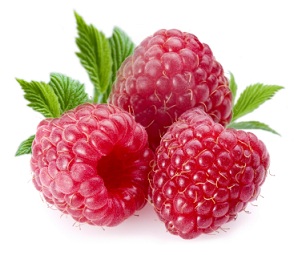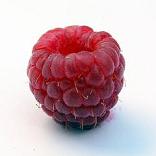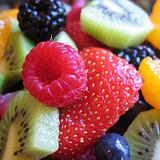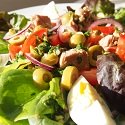Raspberry Nutrition Facts,
Health Benefits of Raspberries
All about raspberry nutrition information, calories in raspberries, nutritional benefits of raspberries, raspberry nutrients
There are many varieties of raspberry and hence they are available in numerous colors, but as consumers we are most familiar with red raspberries that simply melt in our mouth. Raspberries are generally eaten fresh, as juice or as dried fruit. They have a hollow core so we can eat the whole fruit.
Raspberries are very low in calories, just 52 calories per serving (100g or 3.5oz). They contain very little fat and no cholesterol. They are full of vitamin C and manganese providing 44% and 34% respectively of our recommended daily intake (RDI), and are therefore perfect as a snack.
Raspberries provide a very good source of fiber and a good source of vitamin K along with modest amounts of other vitamins and minerals. They provide twice the amount of fiber than strawberries.
They contain ellagic acid which belongs to the phytonutrient tannin. It is thought to inhibit growth of cancer cells. Raspberries also contain an anti-cancer bio-flavonoid called quercetin and contain significant amounts of antioxidants.
The raspberry is placed well on the ORAC table, which is a measure of a fruits antioxidant capacity. Its capacity may be half of what a blueberry or cranberry is, but it’s still significantly above most other fruits.
This fruit is highly perishable, so either eat almost straight away or freeze them for later. Freezing raspberries will lower the concentration of vitamin C though. It’s best to keep them refrigerated and even then will only last a couple of days. They are very delicate so wash carefully. Note that research has shown that the anthocyanins are almost removed when the fruit is processed, therefore purchase either fresh or frozen instead of canned.
Raspberries contain oxalic acid, therefore if you have kidney issues you should probably avoid this fruit or consult your doctor.
Compare raspberry nutrition facts to the other fruits.

Nutritional Value of Raspberries
| Raspberry nutritional value per 100 g (3.5 oz) Refuse: 4%(Caps, stems, and spoiled berries) Scientific Name: Rubus spp. |
|
|---|---|
| Proximates: | |
| Water | 85.75 g |
| Energy | 220 kJ (52 kcal) |
| Protein | 1.20 g |
| Carbohydrates | 11.94 g |
| Total Fat: | 0.65 g |
| Fiber | 6.5 g |
| Cholesterol | 0 mg |
| Minerals: | |
| Calcium, Ca | 25 mg (2.5 %) |
| Iron, Fe | 0.69 mg (4 %) |
| Magnesium, Mg | 22 mg (6 %) |
| Phosphorus, P | 29 mg (3 %) |
| Potassium, K | 151 mg (3 %) |
| Sodium, Na | 1 mg (0.04 %) |
| Zinc, Zn | 0.42 mg (3 %) |
| Copper, Cu | 0.090 mg (5 %) |
| Manganese, Mn | 0.670 mg (34 %) |
| Selenium, Se | 0.2 mcg (0.3 %) |
| Vitamins: | |
| Vitamin C | 26.2 mg (44 %) |
| Thiamine (Vit. B1) | 0.032 mg (2 %) |
| Riboflavin (Vit. B2) | 0.038 mg (2 %) |
| Niacin (Vit. B3) | 0.598 mg (3 %) |
| Pantothenic acid (B5) | 0.329 mg (3 %) |
| Vitamin B6 | 0.055 mg (3 %) |
| Folate (Vit. B9) | 21 mcg (5 %) |
| Vitamin A | 33 IU (0.7 %) |
| Vitamin E | 0.87 mg (4 %) |
| Vitamin K | 7.8 mcg (10 %) |
| Percentages are relative to US Recommended Daily Intake (RDI) for adults. | |
Author: Lana Soko
You Might Also Like:
Like This Page?
|
Share This Page:
|







